Key takeaways:
- Cinematic soundtracks enhance storytelling by deepening emotional connections and evoking vivid memories associated with films.
- Sound plays a crucial role in shaping the viewing experience, affecting suspense and character empathy.
- Blu-ray players offer exceptional audio quality and features like 4K upscaling and streaming service access, enhancing the overall viewing experience.
- Soundtracks provide powerful context to films, making the emotional impact more profound and leaving lasting impressions even outside the film’s narrative.
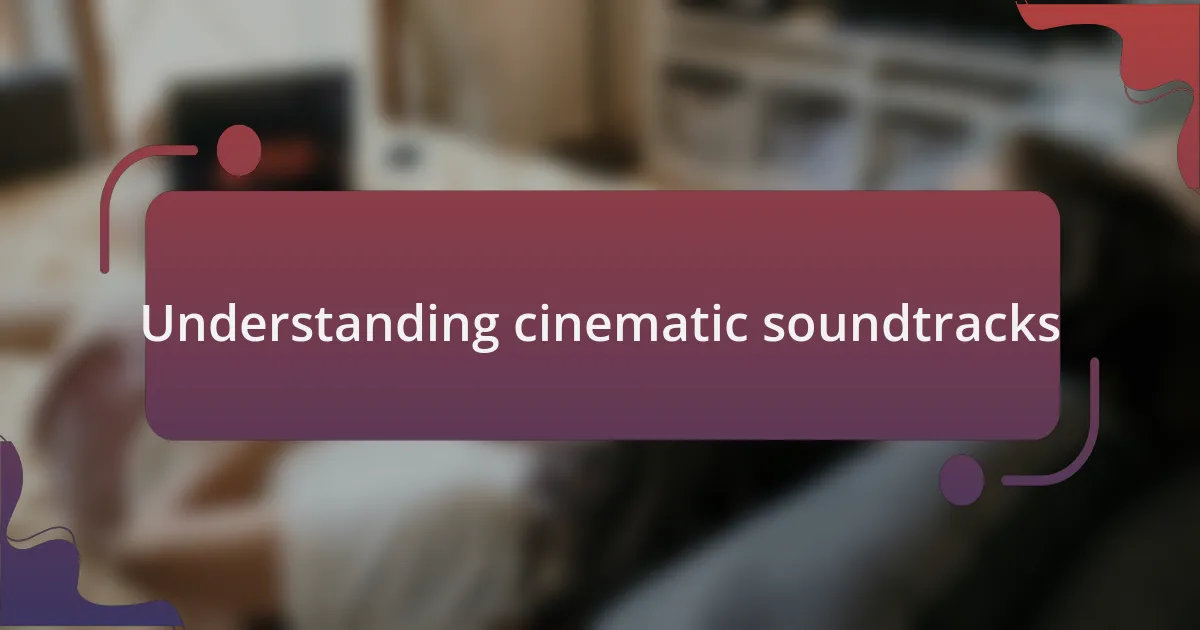
Understanding cinematic soundtracks
Cinematic soundtracks play a crucial role in storytelling, enhancing the emotional depth of a scene. I often recall watching a film where the music swelled just as the hero faced an insurmountable challenge; it was almost palpable. That moment made me wonder, how different would the experience have been without that carefully crafted score?
Listening to a soundtrack outside of the film can evoke vivid memories of the scenes that played out on screen. Just the other day, I was humming an old film score, and instantly, I was transported back to the theater, feeling the thrill and suspense all over again. Isn’t it fascinating how music can trigger such powerful recollections, intertwining our emotions with visual experiences?
Moreover, the composition of these soundtracks often involves intricate layers that reflect the characters’ journeys. I’ve spent hours analyzing why a particular theme resonates so deeply, and it’s enlightening to realize that the subtle shifts in melody can mirror a character’s growth or struggle. This complexity invites us, as listeners, to engage more fully with the narrative, making us ponder how we connect with the stories told through these musical landscapes.
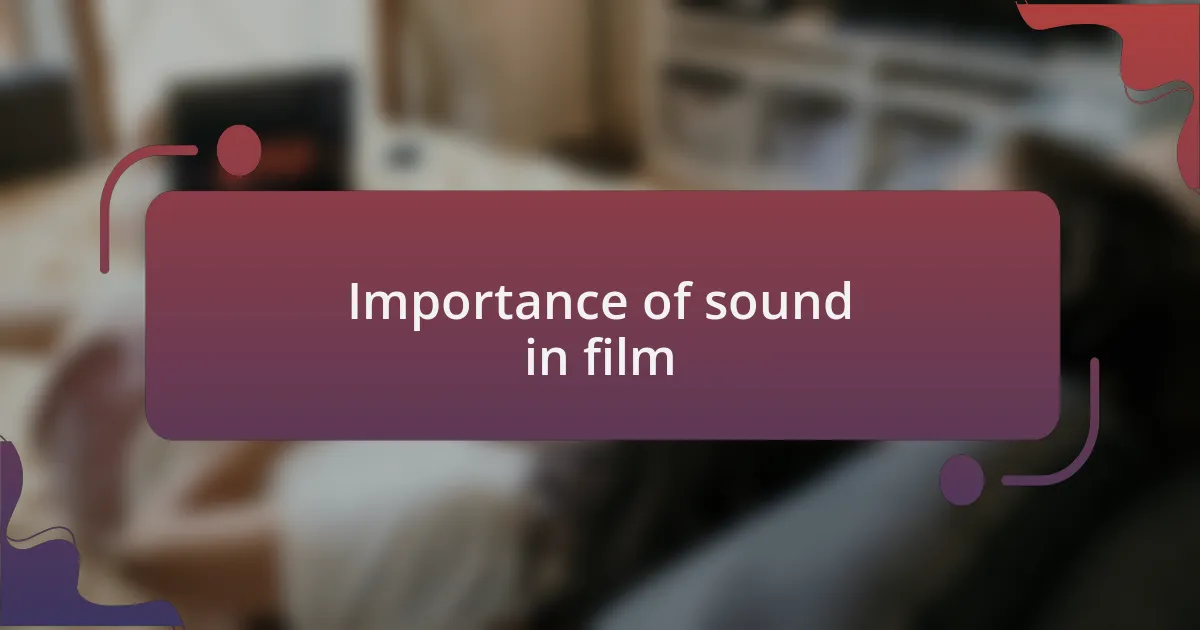
Importance of sound in film
Sound in film is often underestimated, yet it profoundly shapes our viewing experience. I remember watching a horror movie where the silence was deafening just before the jump scare. That pregnant pause, filled with suspense, relied entirely on sound to amplify my fear. If the soundtrack had been less effective, the scare wouldn’t have landed nearly as hard, would it?
Consider how sound can bind us to characters and their emotional arcs. I was once deeply moved by a romantic scene where the soft notes of a piano set a tender tone. It was as if the music was whispering the characters’ feelings, allowing me to empathize with their love story in a way that pure visuals could not. How often do we find ourselves swept away by the score, feeling a connection with the characters that transcends words?
Furthermore, sound design contributes significantly to world-building. I vividly recall the immersive soundscapes in a science fiction film that surrounded me with the hum of spaceships and distant alien chatter. Those sonic elements made the universe feel real and alive, drawing me deeper into the narrative. Doesn’t it make you think about how sound not only complements but sometimes completes the film’s vision?

Features of Blu-ray players
When I think about Blu-ray players, the first feature that stands out is their exceptional audio capabilities. Many people, including myself, have marveled at the crystal-clear surround sound that enriches the viewing experience. Watching my favorite action movie with powerful sound effects enveloping me made me feel as though I were in the middle of the action—each blast and explosion resonated deeply, creating a thrilling atmosphere.
Another noteworthy aspect is the support for high-definition audio formats, such as Dolby TrueHD and DTS-HD Master Audio. I recall the first time I heard a movie’s score in these formats; the nuances of the music were so vivid that it felt like the orchestra was playing right in my living room! It truly highlighted the importance of quality sound; is there anything better than experiencing a film where every note makes your heart race?
Lastly, the versatility of Blu-ray players to connect with other devices is quite impressive. I often utilize Bluetooth connectivity to incorporate my wireless speakers, which transforms a simple movie night into an unforgettable event. The ease of integration allows my home setup to thrive, making it possible for me to explore various sound options and customize my viewing experience. Have you ever wondered how much better your favorite film could sound with the right setup?
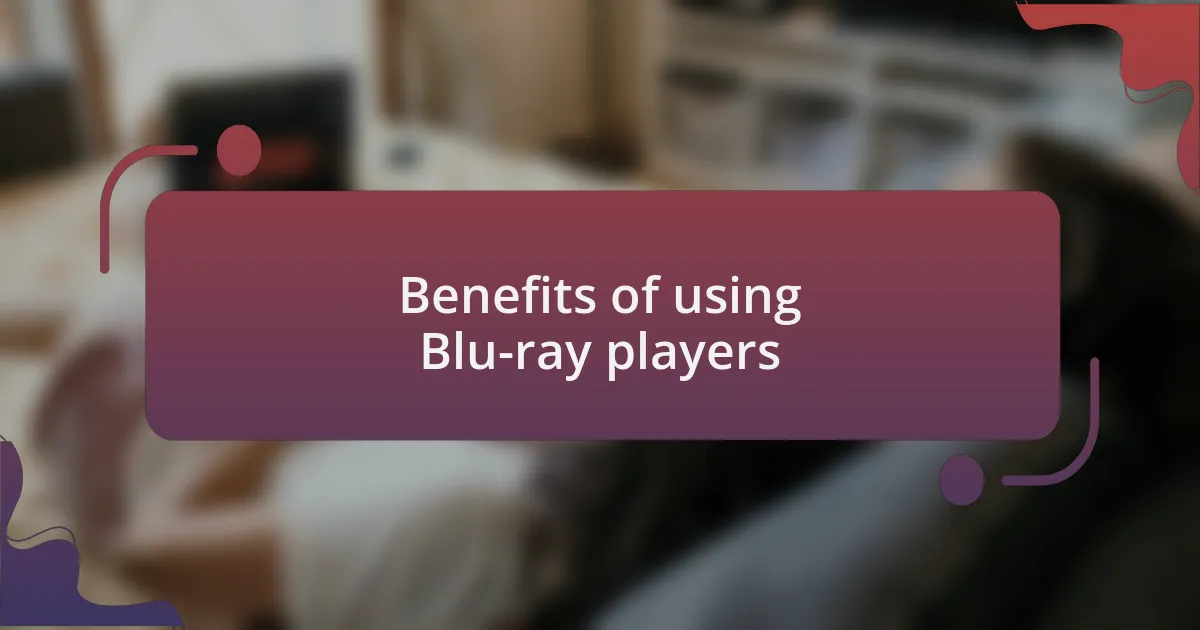
Benefits of using Blu-ray players
One major benefit of using Blu-ray players is their ability to deliver stunning video quality that enhances the whole viewing experience. I still remember the first time I watched a Blu-ray film—I was blown away by the clarity and richness of the image. It felt like I could see every detail, every nuance, which really amplified my connection to the story being told on screen. Who wouldn’t want to experience their favorite film in the best possible light?
Moreover, Blu-ray players often come equipped with features like 4K upscaling. I’ve noticed how this technology breathes new life into my older DVDs. It’s kind of magical to see familiar films transformed into high-definition glory. It begs the question: how many buried movie gems in your collection could be given a fresh lease on life through upscaling?
Furthermore, the ability to access streaming services directly through Blu-ray players is a game-changer. You can easily flip between classic films and the latest blockbusters without having to switch devices. I often find myself starting a new series one evening and then digging into my favorite classics the next. Isn’t it convenient to have everything in one place, especially on cozy nights when I just want to sink into the couch?
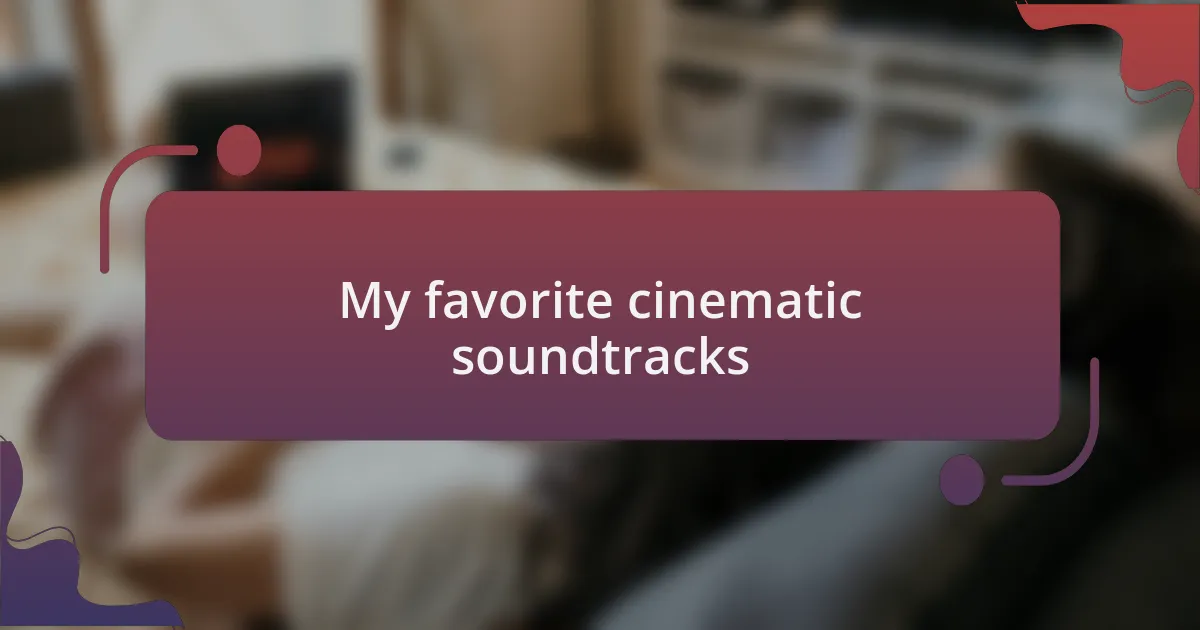
My favorite cinematic soundtracks
Among my favorite cinematic soundtracks, the score from “Inception” stands out. Hans Zimmer’s work here dives deep into the mind’s surreal layers, pulling me into the dreamlike journey of the film. Every time I listen to that powerful, pulsating theme, I can almost visualize the grand landscapes and twisting structures that accompany it—what a brilliant way to amplify the storytelling!
Another score that holds a special place in my heart is the music from “The Lord of the Rings.” Howard Shore’s orchestral compositions have a way of making me feel like I’m right there in Middle-earth, facing dragons and walking alongside hobbits. There’s something about that sweeping, epic sound that evokes a sense of adventure, stirring nostalgia for the first time I witnessed the fellowship’s journey on screen. Has any soundtrack ever made you feel that deeply connected to a story?
Lastly, I can’t overlook the emotional depth of the “Schindler’s List” soundtrack. John Williams’ hauntingly beautiful violin piece often resonates with me. It captures such profound sorrow and resilience that it stays with me long after the film ends. Listening to it again brings me back to those powerful scenes, reminding me of the importance of remembering history. Isn’t it fascinating how music can shape our understanding of a film and evoke feelings even outside of its context?
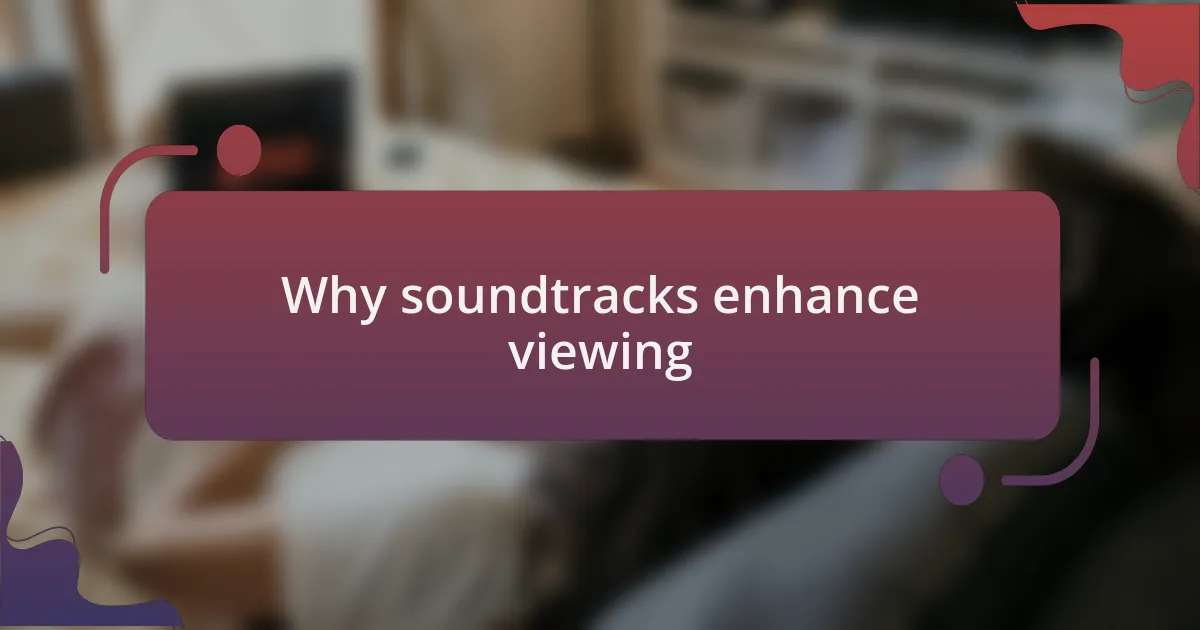
Why soundtracks enhance viewing
Soundtracks play a crucial role in shaping the viewer’s emotional experience during a film. I remember watching “Gladiator,” where Hans Zimmer’s score underscored the intense battle scenes. The music filled the air with a palpable tension that made my heart race each time it swelled, enhancing the adrenaline rush of the visuals.
When I think about the way soundtracks immerse us in a story, I can’t help but reflect on how they set the tone. In “Amélie,” the playful, whimsical melodies perfectly captured the essence of the protagonist’s quirky adventures in Paris. It’s interesting to consider: how would the film feel without that light-hearted score? I doubt it would have left such a lasting impression.
Moreover, soundtracks often provide a powerful context that words alone cannot convey. For instance, the moment I heard the score from “Interstellar,” I felt a deep sense of awe and curiosity about space exploration. That haunting yet uplifting music pulled me into the film’s complexity, making me ponder our existence long after the credits rolled. Isn’t it amazing how a well-crafted soundtrack can linger in our minds, transforming how we perceive the visuals?

Tips for enjoying soundtracks better
To truly enjoy soundtracks, I often recommend turning off distractions. I’ve found that when I focus solely on the music, I can pick out layers and nuances I otherwise might miss. Have you ever noticed how a quiet moment in a score can enhance an emotion or a scene? It’s like peeling back the layers of an onion—the more you focus, the more you discover.
Another tip I swear by is creating the right atmosphere for listening. Whether it’s dimming the lights or finding a comfortable spot, setting the mood can elevate your experience. I remember one rainy afternoon when I played the soundtrack from “The Shape of Water,” and the combination of the visuals and the haunting melodies made for a deeply immersive experience. How can something as simple as ambience change what we feel?
Lastly, don’t hesitate to revisit your favorite soundtracks. We often listen in the background while multitasking, but I recommend sitting down with the music and allowing yourself to feel. Shortly after rediscovering the score of “Inception,” I realized how many emotions I had overlooked during previous listens. It’s amazing how revisiting a piece can provide new insights and deeper emotional connections. What soundtrack do you think deserves a second listen?